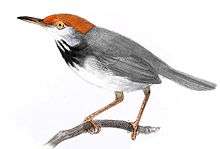Cambodian tailorbird
The Cambodian tailorbird (Orthotomus chaktomuk) is a species of bird endemic to Cambodia, likely confined to a single dense shrub habitat in the floodplain of the Mekong river. It was first discovered and recorded by scientists in 2009 in Phnom Penh, the capital of Cambodia, during avian influenza checks. In 2013, it was determined to be a unique species and formally described. It is a very small bird, about 10 cm long, with an orange-red tuft on its head.
| Cambodian tailorbird | |
|---|---|
 | |
| Scientific classification | |
| Kingdom: | Animalia |
| Phylum: | Chordata |
| Class: | Aves |
| Order: | Passeriformes |
| Family: | Cisticolidae |
| Genus: | Orthotomus |
| Species: | O. chaktomuk |
| Binomial name | |
| Orthotomus chaktomuk Mahood et al., 2013[2] | |
Discovery
The Cambodian tailorbird was discovered in Phnom Penh, the capital of Cambodia, in 2009, during avian influenza checks.[2] Since then, it has been spotted in various parts of Phnom Penh, including on a construction site where bird researcher Ashish John photographed it.[3] His picture was later used to help describe the bird.[3]
In June 2012, John began collaborating with the Wildlife Conservation Society, BirdLife International, the University of Kansas, Louisiana State University, and the Sam Veasna Centre to test the bird's plumage, genetics, and song.[3][4] The tests determined that it was a unique species.[5] The paper formally describing the Cambodian tailorbird was published in a special online early-view issue of the Oriental Bird Club's journal Forktail.[2] Its specific name comes from a Khmer word which means four-faces, which describes where the bird is found: in the floodplain where the Bassac River, Mekong, and Tonlé Sap meet.[6]
Description
The Cambodian tailorbird has a tuft of orange-red feathers on its head, and black feathers on its throat.[4] The rest of its body is light and dark gray. It is about the size of the Eurasian wren. The Cambodian tailorbird is known for its "loud call".[4]
Habitat
The Cambodian tailorbird lives in a small area of dense scrubland within the floodplain of the Mekong river.[5] The dense shrub habitat allowed it to remain undetected for so long despite living on the outskirts of a major city. It is one of two bird species endemic to Cambodia, the other being the Cambodian laughingthrush.[3]
The discoverers of the Cambodian tailorbird recommended that it be listed as "near threatened" on the International Union for Conservation of Nature's Red List.[5] They said it was at risk because its habitat is declining as a result of increased urbanisation. Most newly discovered species are categorised as such.[3]
See also
- Bird species discoveries
References
- BirdLife International (2017). "Orthotomus chaktomuk (amended version of 2016 assessment)". IUCN Red List of Threatened Species. 2017: e.T103778254A112425450. doi:10.2305/IUCN.UK.2017-1.RLTS.T103778254A112425450.en. Retrieved 13 January 2020.
- Mahood, SP; A.J.I. John; J.C. Eames; C.H. Oliveros; R.G. Moyle; Hong Chamnan; C.M. Poole; H. Nielsen; F.H. Sheldon (2013). "A new species of lowland tailorbird (Passeriformes: Cisticolidae: Orthotomus) from the Mekong floodplain of Cambodia" (PDF). Forktail. 29: 1–14. Archived from the original (PDF) on 2013-09-28. Retrieved 2013-06-26.
- "Cambodian tailorbird: new species discovered in Phnom Penh". The Guardian. 2013-06-26. Retrieved 2013-06-26.
- "Cambodian Tailorbird". AFP. June 26, 2013. Retrieved June 26, 2013.
- "Cambodian tailorbird: A new species seen in Phnom Penh". BBC News. 2013-06-26. Retrieved 2013-06-26.
- Fowlie, Martin (2013-06-26). "Hiding in plain sight: New species of bird discovered in capital city". IUCN Red List. Retrieved 2013-06-27.
External links
- Oriental Bird Images: Cambodian Tailorbird Selected images
